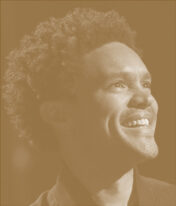Acceptance Speech
Your Majesty, Your Royal Highness, esteemed members and distinguished guests of the Erasmus Prize Foundation.
As the youngest recipient I will be reading my speech from my phone. It is truly an honour to be standing here as a recipient of this prestigious accolade. And to be honest, it’s really a little unbelievable. Mostly because I never thought there was anything that could bring me to Amsterdam in the winter. But also because when I started my career in comedy, I never once dreamed that the tiny stage that I was standing on in Johannesburg would become the first piece of an intricate puzzle that would connect me to people from all over the world. All I wanted, and all I ever hoped for in that moment, was that I could find a way to connect with the twenty people who were sitting in that room. Many of whom were drunk. And to be honest, that’s what comedy is to me, that’s what comedy means to me.
People always ask me the question: what is comedy? For me, comedy is connection. And I think the power of connection lies in its ability to bridge diverse perspectives. It helps us foster understanding and innovation. I believe when individuals with different viewpoints engage in dialogue, they are presented with an opportunity to expand their horizons and appreciate the multifaceted nature of complex issues. This connection does not necessarily aim for consensus – I think that’s oftentimes a mistake that people make, but rather it cultivates a mutual respect for different opinions, which can be a catalyst for creative solutions. Similarly, connecting disparate ideas can lead to groundbreaking innovations. I’ve always thought the synthesis of varied concepts often gives rise to a novel approach that would not have been possible within the confines of a single discipline or ideology. In essence, for me, the power of connection lies in its capacity to transform division into collaboration, and disparate thoughts into a cohesive and innovative vision.
Growing up in South Africa, a land marked by its complex history and vibrant diversity, I learned very early on that laughter is not just a form of entertainment. But it’s a means of survival. In the shadow of Apartheid where divisions ran deep and the future was uncertain, laughter was often the balm that soothed our wounds, and the bridge that to this day still connects divided communities.
Today, as I look back on those days, from the shores of the Netherlands, a nation that has navigated its own complex journey through history, I see the universal power of laughter and its ability to heal and unite. Our shared histories, marked by pain and struggle, also carry stories of resilience, hope, and the unyielding human spirit. Connection to me is more than just a physical or digital interaction. It’s the deep human bond that forms when we share our stories, when we share our struggles, when we share our joys. It’s about understanding that beneath our different exteriors we all share the same fears, hopes and dreams. It’s the realisation that whether you’re from Amsterdam or Johannesburg, we’re all navigating this complex journey of life together. Compassion is the thread that weaves through the tapestry of our shared humanity. It’s the ability to empathise with the pain of others, to understand that despite our different paths, we all seek happiness, we all seek love, we all seek acceptance. It’s what has driven me my life and my career, and it’s the thing that drives me to use humour – not just to entertain, but to enlighten, to challenge and to comfort myself as well as others.
I’ve always thought that the power of laughter in spite of pain is a remarkable force. It has the ability to break down barriers, to open our hearts, and to remind us that even in our darkest moments, there is light. In South Africa we often laughed to keep from crying. We found humour in the absurdity of our reality. Not to diminish our struggle, but to face it with the strength that defies oppression. The Dutch too have a rich history of using humour and satire as a tool. From the sharp wit of Erasmus himself to the vibrant satire in Dutch art and literature, there is a clear understanding that laughter is not just a reaction but it’s also innately a rebellion. A rebellion against despair, a rebellion against injustice and against apathy.
As I accept this prestigious award, I do so with a hope – well, two hopes. One, that Your Majesty will reconsider sitting on a laureate’s lap… and the second hope, that I will continue to use my voice and my platform to foster connection, to spread compassion and to wield the power of laughter in the face of pain.
I implore every single person here: let us remember that our shared laughter is not just a moment of joy but a symbol of our collective resilience and our unbreakable spirit, even in the darkest of times. To the Royal House of the Netherlands, to the Erasmus Prize Foundation, and to all of you who believe in the power of connection, compassion and laughter: I thank you from the bottom of my heart. May we continue to find reasons to laugh together, even in the most challenging times.
And P.S., I am very proud that after 220 years, a South African has been able to take a few resources from the Netherlands back to the Cape. Thank you.
